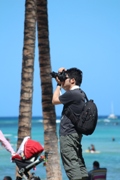
What Will You Learn In This Course?
Learn to take photographs to specification and how to submit them for publication with this course. Photojournalism also has ethical and social considerations that need to be addressed when you are taking photographs for publishing.
With so many would-be photographers around, publishers can afford to be very choosy. Most will only accept work from photographers who have already been published, but getting that first work published can be a daunting and difficult task. Many very good photographers just never get published at all.
In the course, you will -
- Develop your writing and photography skills.
- Improve your creativity.
- Learn more -
- Composition
- Ethics
- The history of photojournalism
- Publishing Opportunities
- Photographic Stories
- And much more.
Course Aim
Improve your understanding of ethical and social issues involved with photojournalism and develop your ability to take photographs to specification, submitting those images for publication in a periodical, such as newspapers, websites, magazines, ezines etc.
Course Content
This course takes you through the processes of taking photos for a specific publication, submitting work for publication, and meeting the requirements of an editor and publisher.
There are 11 lessons in this course:
1/ A Short History of Photojournalism
- Overview
- History of photojournalism
- Famous photographers
- Margaret Bourke-White
- Gordon Parks
- Diane Arbus
- Nick Ut
- Larry Burrows
2/ Ethics and Photojournalism
- Hypothetical - What are ethics?
- Schools of Philosophy
- Utilitarianism
- Rationalism
- Humanism
- Kant
- Socrates
- Other philosophers
- Digital manipulation and ethics
- How ethical is digital manipulation?
- Real life
- Codes of ethics
- Guidelines for making ethical decisions
- Ethics in practice
3/ What Should I Photograph?
- Composition
- Things to consider
- Camera techniques to help with composition
- Principles of photographic composition
- Qualities of the components
- Effects of different angles on the subject
- Legal issues
4/ How Should I Photograph It?
- Terms to learn and understand
- Depth of field
- Digital vs conventional photography
- Shutter speed
- Development of photographic style
- Equipment and materials
- Sensitometry
- Lighting
5/ Photo Stories / Editing Images
- Ethics of digital manipulation
- Controversy of fairy photos
- Correctly interpreting photos
6/ Publishing Opportunities
- Portfolio
- Online portfolio
- Direct portfolios
- Slide portfolios
- CDs
- Using flash
- Music
- Standing out
- Writing a cover letter
- Your resume
- Creating a job hunt database
- How to get work
- How to find a job
- What type of clients do you want?
7/ Working to Specification / Problem Based Learning
- Photography specifications
- Consistency
- PBL Project to develop and draft submission specifications for an electronic publication and then shoot a photo story which meets these specifications. You firstly need to identify two possible subjects for a photo story for that publication, and then follow one of these stories for an extended period of time. You will then select and edit your images - to meet the specifications created for that publication.
8/ Publishing Using Online Management Systems
- Types of digital files
- Publishing online
9/ Taking Photos and Submitting Images
- Portraiture vs photojournalism
- Sports photography
- Freezing action
- Blurring movement
- Panning
- Sports photography using a digital SLR
- Photographing an event
- Submitting images for publication
10/ Writing Articles and Captions to Accompany Your Image
- Sentences and phrases
- Writing effective sentences
- Choosing effective words
- Paragraphs
- Punctuation
- Newsworthy articles
- News values
- Storyline
- Writing a news article
- Writing captions
11/ Revising Submitted Work
- Tips to improve your work
Each lesson culminates in an assignment which is submitted to the school, marked by the school's tutors and returned to you with any relevant suggestions, comments, and if necessary, extra reading
What Next?
- Keep ahead of your competition - your professional photography and writing skills are nurtured and developed throughout the course.
- You learn about the whole industry - by studying with us you are laying a foundation to develop more specialised skills if you so choose.
- Learn how to market your own business or freelance services.
- Study photojournalism to improve your career in journalism, writing, blogging, influencing etc.
You can enrol today by clicking the “Enrol Now” button above.
Or
Click here to contact a writing tutor.
Or Request a Prospectus Here.